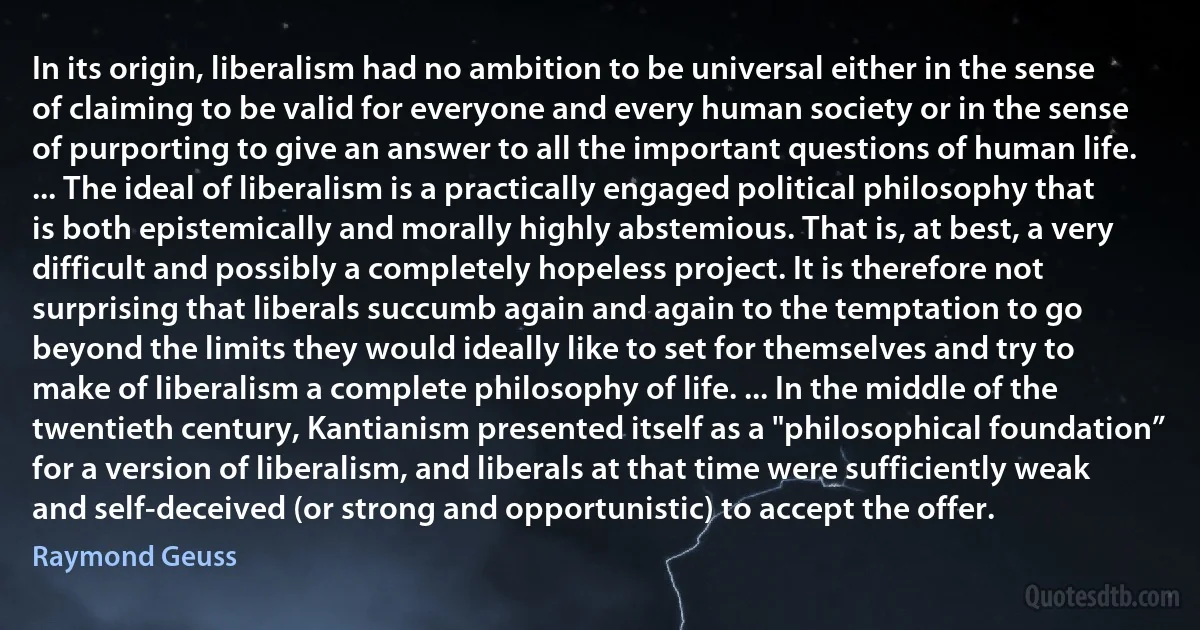
In its origin, liberalism had no ambition to be universal either in the sense of claiming to be valid for everyone and every human society or in the sense of purporting to give an answer to all the important questions of human life. ... The ideal of liberalism is a practically engaged political philosophy that is both epistemically and morally highly abstemious. That is, at best, a very difficult and possibly a completely hopeless project. It is therefore not surprising that liberals succumb again and again to the temptation to go beyond the limits they would ideally like to set for themselves and try to make of liberalism a complete philosophy of life. ... In the middle of the twentieth century, Kantianism presented itself as a "philosophical foundation” for a version of liberalism, and liberals at that time were sufficiently weak and self-deceived (or strong and opportunistic) to accept the offer.
Raymond GeussRelated topics
ambition answer best beyond century everyone human liberalism life middle offer project sense set surprising temptation time try universal version questionsRelated quotes
Although what is called ‘philosophical speculation' is undoubtedly on the decline, many of the practically minded have not yet freed themselves from a method of reasoning, which, in the last analysis, has its roots in theology and metaphysics. No science which pretends to be exact can accept an untested theory or doctrine; yet even in an exact science there is often an admixture of magic, theology, and philosophy. It is one of the tasks of our time to aid scientific reasoning to attain its goal without hindrance. Whoever undertakes this is concerned not so much with ‘philosophy,' properly speaking, as with ‘anti-philosophy.' For him there is but one science with subdivisions - a unified science of sciences. We have a science that deals with rocks, another that deals with plants, a third that deals with animals, but we need a science that unites them all.

Otto Neurath
The Socialistic schools, prescinding from the barbarous multitudes which follow them, and considered in their doctors and masters, are far superior to the Liberal school, just because they go straight to all the great problems and questions, and because they always propose a peremptory and decisive solution. Socialism is strong, only because it is a theology; and it is destructive, only because it is a satanic theology. The Socialistic schools, in as much as they are theological, will prevail over the Liberal school, in as much as it is anti-theological and sceptical; and inasmuch as they are satanic, they will succumb before the Catholic school, which is at once theological and divine. Their instincts must be in accord with our assertions, if we consider that they treasure up their hatred for Catholicism, while they have only contempt for Liberalism.

Juan Donoso Cortés
I am reminded each day that I render decisions that affect people concretely and that I owe them constant and complete vigilance in checking my assumptions, presumptions and perspectives and ensuring that to the extent that my limited abilities and capabilities permit me, that I reevaluate them and change as circumstances and cases before me requires. I can and do aspire to be greater than the sum total of my experiences but I accept my limitations. I willingly accept that we who judge must not deny the differences resulting from experience and heritage but attempt, as the Supreme Court suggests, continuously to judge when those opinions, sympathies and prejudices are appropriate. There is always a danger embedded in relative morality, but since judging is a series of choices that we must make, that I am forced to make, I hope that I can make them by informing myself on the questions I must not avoid asking and continuously pondering.

Sonia Sotomayor
Spinoza is a highly systematic thinker, but still I do not think I can offer a single key for all things Spinozistic. Personally, one thing which got me excited about Spinoza is his philosophical boldness, i. e., his willingness to pursue philosophical exploration as far as he can, making very little concessions to commonly accepted beliefs and norms. In terms of content, I take his attempt to conceive of God, nature, and ethics in a manner that is free from anthropomorphism and anthropocentric illusions as one of the deepest elements of his philosophical thinking. A closely related issue is his advocacy of actual infinity (an issue that has been mostly neglected in recent literature). Finally, the very attempt to do philosophy systematically (rather than rely on fragmented and disassociated intuitions) and transparently (laying bare the logical structure of his arguments) commands my respect, indeed admiration.

Baruch Spinoza
Whenever this effect shall be produced among us; whenever the vicious portion of [our] population shall be permitted to gather in bands of hundreds and thousands, and burn churches, ravage and rob provision stores, throw printing-presses into rivers, shoot editors, and hang and burn obnoxious persons at pleasure and with impunity, depend upon it, this government cannot last. By such things the feelings of the best citizens will become more or less alienated from it, and thus it will be left without friends, or with too few, and those few too weak to make their friendship effectual. At such a time, and under such circumstances, men of sufficient talent and ambition will not be wanting to seize the opportunity, strike the blow, and overturn that fair fabric which for the last half century has been the fondest hope of the lovers of freedom throughout the world.

Abraham Lincoln
